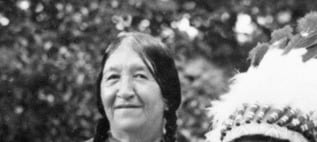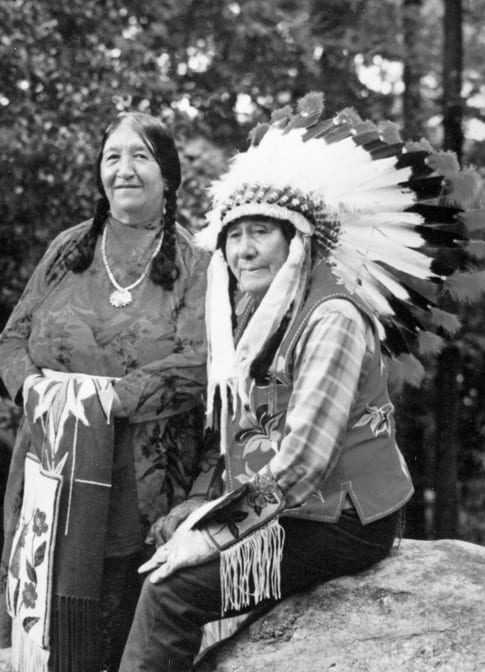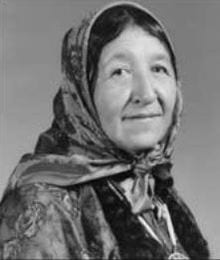
In an effort to remain accountable to communities who have been negatively impacted by past and present medical injustices, the staff at Himmelfarb Library is committed to the work of maintaining an anti-discriminatory practice. We will uplift and highlight diverse stories throughout the year, and not shy away from difficult conversations necessary for health sciences education. To help fulfill this mission, today's blog post examines the life and activism of Susie Walking Bear Yellowtail.
Susie Walking Bear Yellowtail was a Native American nurse who consistently advocated for better access to quality, culturally sensitive healthcare and during her decades long medical career, she documented and recounted stories of medical abuse that Native Americans frequently experienced when visiting hospitals or non-Native doctors. Yellowtail was one of the first Native American registered nurses and the first registered nurse from the Crow people. Her work as an activist paved the way for other medical professionals who sought to end harmful practices that frequently impacted lower-class families and people of color.
Yellowtail was born on January 27, 1903 on the Crow Indian Reservation in Montana. She was orphaned at a young age, but lived with an aunt who took care of Yellowtail and her sister. Like many young Native children, Susie Yellowtail attended an Indian boarding school until she met the Baptist missionary, Frances Shaw. Yellowtail traveled with Shaw to a Baptist convention in Denver, before moving to Oklahoma to complete her education at the Bacone Indian School. When Frances Shaw married and became Mrs. Clifford Fields, Yellowtail once again moved to the East where she lived with the Fields family. During this time, Susie Yellowtail enrolled in Northfield Seminary. Mrs. Fields paid for the tuition fees, but to afford her room and board, Yellowtail worked as a nanny and maid for the Fields family. Eventually she left the seminary and instead enrolled in a nursing program at Franklin County Memorial Hospital and completed her training at the Boston City Hospital School of Nursing. She received her degree in 1927 and worked in several different positions before returning to the reservation where she was born.
Working as a nurse for the Indian Health Service’s run hospital, Yellowtail witnessed firsthand the mistreatment many Crow people experienced during their appointments. She “documented instances of Indian children dying from lack of access to medical care, Indian women being sterilized without consent, and tribal elders unable to communicate their health concerns to doctors.” (Women's History Matters) Yellowtail sought to provide better treatment for her community and was vocal with her criticisms of the non-Native doctors, nurses and medical professionals who worked in the hospital. She blended her Crow culture and traditions with her medical education to care for Native patients who were nervous around the hospital staff or unable to access the hospital and its services. In 1929, Susie Walking Bear married Thomas Yellowtail and the two became major leaders on the reservation.

Susie Walking Bear Yellowtail served as a member of several reservation advisory committees and this eventually led to President John F. Kennedy appointing her to the Surgeon General’s Advisory Committee on Indian Health. She was reappointed to this position by both the Johnson and Nixon administrations. In this role, Yellowtail traveled to other Native American reservations and documented Native Americans’ experiences with visiting their hospitals. Almost immediately, she noticed a similarity in stories and used this information to create recommendations that would improve not only the relationship between Native Americans and health professionals, but also address years of harm that went unchecked. Susie Yellowtail continued her work for decades and died on December 25, 1981.
Yellowtail received recognition for her work both during her lifetime and after her passing. She was awarded the President’s Award for Outstanding Nursing by President Kennedy in 1962 and she was inducted into the Montana Hall of Fame in 1987. In 2002, she was also inducted into the American Nurses Association Hall of Fame.
While Susie Walking Bear Yellowtails’ career and advocacy efforts positively impacted the Crow people and other Native American tribes in her lifetime, her work served as an example on how health rights activists could monitor and document patient mistreatment by the medical field. Yellowtail used her Crow identity and nursing education to provide culturally sensitive care to the Native Americans who requested her services. As one of the first registered nurses of Native American descent, Susie Yellowtail embedded herself in the medical field and brought about long-lasting changes that can still be felt to this day.

Sources
“Susie Walking Bear Yellowtail: ‘Our Bright Morning Star.’” Women’s History Matters, 6 May 2014, montanawomenshistory.org/susie-walking-bear-yellowtail-our-bright-morning-star.
Theobald, Brianna. “Nurse, Mother, Midwife-Susie Walking Bear Yellowtail and the Struggle for Crow Women’s Reproductive Autonomy.” Montana The Magazine of Western History, vol. 66, no. 3, 2016. National Indigenous Women’s Resource Center, www.niwrc.org/resources/journal-article/nurse-mother-midwife-susie-walking-bear-yellowtail-and-struggle-crow.


